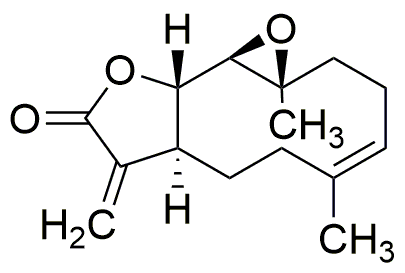Parthenolide is widely utilized in research focused on:
- Anti-inflammatory Applications: This compound is known for its ability to inhibit inflammatory pathways, making it valuable in developing treatments for conditions like arthritis and other inflammatory diseases.
- Cancer Research: Parthenolide has shown promise in inducing apoptosis (programmed cell death) in various cancer cell lines, which is crucial for researchers looking for new cancer therapies.
- Neuroprotective Effects: Studies suggest that it may protect neurons from damage, offering potential applications in treating neurodegenerative diseases such as Alzheimer's and Parkinson's.
- Natural Pesticide Development: Its natural origin and effectiveness against certain pests make it a candidate for developing eco-friendly pesticides, appealing to the agricultural sector.
- Antimicrobial Properties: Parthenolide has demonstrated activity against various pathogens, which can be beneficial in formulating new antimicrobial agents for medical and industrial use.
General Information
Properties
Safety and Regulations
Applications
Parthenolide is widely utilized in research focused on:
- Anti-inflammatory Applications: This compound is known for its ability to inhibit inflammatory pathways, making it valuable in developing treatments for conditions like arthritis and other inflammatory diseases.
- Cancer Research: Parthenolide has shown promise in inducing apoptosis (programmed cell death) in various cancer cell lines, which is crucial for researchers looking for new cancer therapies.
- Neuroprotective Effects: Studies suggest that it may protect neurons from damage, offering potential applications in treating neurodegenerative diseases such as Alzheimer's and Parkinson's.
- Natural Pesticide Development: Its natural origin and effectiveness against certain pests make it a candidate for developing eco-friendly pesticides, appealing to the agricultural sector.
- Antimicrobial Properties: Parthenolide has demonstrated activity against various pathogens, which can be beneficial in formulating new antimicrobial agents for medical and industrial use.
Documents
Safety Data Sheets (SDS)
The SDS provides comprehensive safety information on handling, storage, and disposal of the product.
Product Specification (PS)
The PS provides a comprehensive breakdown of the product’s properties, including chemical composition, physical state, purity, and storage requirements. It also details acceptable quality ranges and the product's intended applications.
Certificates of Analysis (COA)
Search for Certificates of Analysis (COA) by entering the products Lot Number. Lot and Batch Numbers can be found on a product’s label following the words ‘Lot’ or ‘Batch’.
Número de catálogo
Número de lote/lote
Certificates Of Origin (COO)
This COO confirms the country where the product was manufactured, and also details the materials and components used in it and whether it is derived from natural, synthetic, or other specific sources. This certificate may be required for customs, trade, and regulatory compliance.
Número de catálogo
Número de lote/lote
Safety Data Sheets (SDS)
The SDS provides comprehensive safety information on handling, storage, and disposal of the product.
DownloadProduct Specification (PS)
The PS provides a comprehensive breakdown of the product’s properties, including chemical composition, physical state, purity, and storage requirements. It also details acceptable quality ranges and the product's intended applications.
DownloadCertificates of Analysis (COA)
Search for Certificates of Analysis (COA) by entering the products Lot Number. Lot and Batch Numbers can be found on a product’s label following the words ‘Lot’ or ‘Batch’.
Número de catálogo
Número de lote/lote
Certificates Of Origin (COO)
This COO confirms the country where the product was manufactured, and also details the materials and components used in it and whether it is derived from natural, synthetic, or other specific sources. This certificate may be required for customs, trade, and regulatory compliance.


